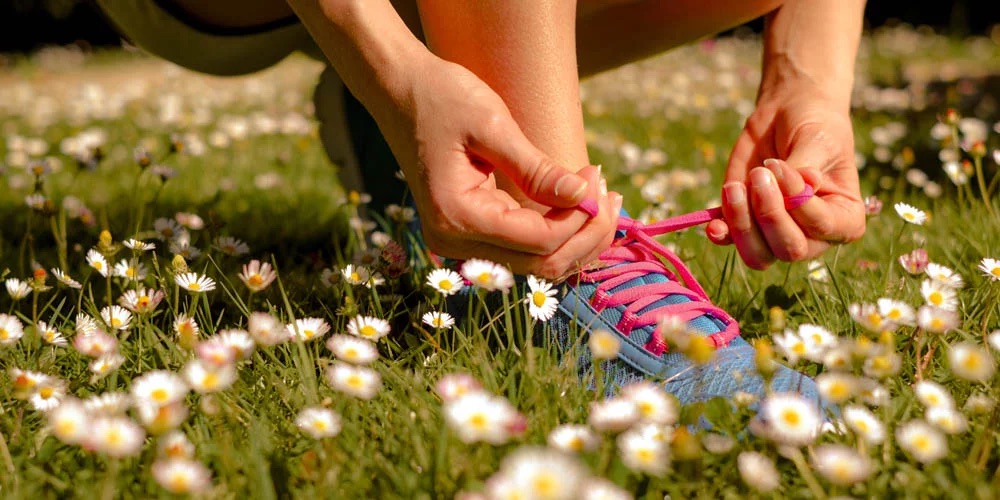Runners with allergies can perform at 100%. Because there is a tailor-made therapy for almost all of them.
 Author:
Author:
Patrik Noack, MD, specialist in general internal medicine SGIM and sports medicine SEMS, Health Performance Officer of Swiss Olympic, Chief Medical Officer Swiss Athletics and Swiss Cycling, association doctor at Swiss Triathlon, Swiss Taekwondo and Swiss Ski Biathlon, Head of Medical Centre and Head of Sports Medicine at Medbase Sports Medical Center Abtwil.
For those who are allergic to pollen, spring usually means a runny nose, itchy eyes, tickling palate, poor sleep and feeling tired all the time. Many runners with hay fever stick to the motto: suffer and be sick – but there are effective ways to reduce the symptoms so that they do not impair performance.
Tip 1: Adapt your training to the pollen season
If possible, adjust your training to the pollen count and run mainly in the early morning or after rain, because there is less pollen in the air then. The pollen bulletin informs you about which pollen is flying and when. If you can’t time your exercise according to the pollen levels, you could switch to the treadmill when pollen counts are high, preferably to a gym that has a ventilation system with good pollen filters.
Tip 2: Remove the pollen
Before running, you can apply some Vaseline-based pollen-blocking cream under your nose. After exercise, remove pollen by rinsing your nose with a little saline solution (a two to three percent saline solution is ideal). To do this, hold one nostril closed and gently pull up the water with the other. The water will then run out of your nose and mouth. Alternatively, you can buy a “nasal douche” from a specialist shop and use it to rinse your nose.
Tip 3: Good basic therapy
Find out what medicines or therapies work best for you to help you breathe better or have less itchy eyes. Maintain this basic therapy throughout the allergy season. Besides the well-known symptom-relieving antihistamines, herbal remedies with butterbur extract or traditional Chinese medicine are also possible.
If you have a severe allergy, with or without asthma, and the usual treatment does not work, consult a specialist. Under certain conditions, health insurance will pay for a therapy with specific antibodies that slow down the excessive immune reaction.
Tip 4: Don’t be afraid of cortisone
Cortisone has – wrongly – a bad reputation. Modern nasal and asthma sprays contain only very small amounts that act directly on the mucous membrane. The effect of these small doses on the rest of the body is very small and negligible, even with prolonged use. Cortisone and its chemical relatives have an anti-inflammatory effect and reliably reduce allergic symptoms. A note on application: Do not spray the nasal spray in the direction of the nasal septum.
Performance diagnostics at Medbase
The sports scientists and sports physicians at Medbase check your performance level with an endurance test. Based on this, they explain to you in a clear and uncomplicated way how you can optimally incorporate the results into your training.
Book now
Tip 5: Save money on unnecessary allergy tests
Bioresonance or kinesiology tests often give unreliable results. They are not suitable for finding out what you are allergic to. You should also be cautious about expensive blood tests offered on the internet. It is better to first observe to which pollen or substances your body reacts with allergic symptoms and reduce contact with them or completely avoid them. If in doubt, ask a doctor. They can order an allergy test on the skin or in the blood, depending on the question and symptoms.
Tip 6: Consider other allergies
If you have allergic symptoms outside of the pollen season, you may be allergic to other substances, such as dust mites. In this case, further medical examinations and allergy tests are advisable. Simple measures such as mite-proof mattress covers can provide relief.
Tip 7: Anti-allergic medication and doping test
As long as you use eye drops, nasal or asthma sprays in the usual dosage, you have nothing to worry about in case of a doping test at a competition. However, there can be problems if you exceed a certain dose of certain substances, for example if you take cortisone tablets or if a medicine contains substances that are on the doping list. If you are planning to take part in a competition where doping tests might be carried out, you should find out in good time. Further information can be found here and here.
Who is Medbase?
Medbase is the largest multidisciplinary sports medicine network in Switzerland and offers specialised sports medicine services for athletes, clubs and sports federations at all levels of activity in the fields of sports medicine, sports physiotherapy, performance diagnostics and training advice.


